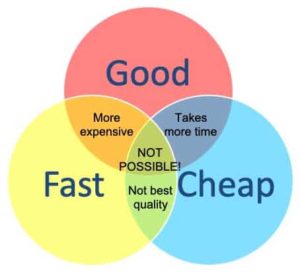If you commission or conduct market research, then this post is a must-read. It shares ten important reasons I have learnt over the years for NOT running a market research project, but which are unfortunately still prevalent today. Which, if any, are you guilty of? Leave your comments below – I dare you!
#1. WHEN THE ISSUE / OPPORTUNITY IS NOT CLEAR AND THE OBJECTIVES ARE NOT WELL DEFINED
Most organisations will have a briefing of some sort, written or oral, for each piece of research that is required. It usually includes the background to and the objectives of the project. These should be specified in terms of the opportunity or issue identified, as well as the relevant information and data already gathered and analysed.
If the briefing doesn’t include these basic elements, it might mean that someone wants to know or understand something and just thought research could quickly provide them with the answers. Wrong! The best studies come from a thorough situation analysis which should include a complete review of all current knowledge and past research findings.
#2. WHEN THE COST WOULD EXCEED THE VALUE OF DOING THE RESEARCH
Following on from the above point, when requesting a study, if the objectives are well defined, then the decisions and actions resulting from the findings should be clear. If they are, then the expected benefit of the information to be gathered will be evident.
Thinking about how you will use the data and information gathered is one of the best ways to estimate the true value of a piece of research. If the decisions and actions to be taken cannot be clearly expressed, then the research results will be just “nice to know” and not “need to know”. It also suggests that the objectives have not been well defined and I would suggest you revise them before continuing.
#3. WHEN THE BUDGET IS TOO SMALL TO DO AN ADEQUATE JOB
Most agencies would agree that clients often want a top-class work, but at a lower price than it would cost. Some clients even make a point of negotiating all prices downwards on principle. But this is a bad and futile habit. Their reputation soon goes before them. Agencies will then start adding an amount that they will remove in answering the client’s request for a cost reduction. If an agency is to become a true partner then transparency is one of the foundations, in both directions.
A second example of this aspect of cost is when a client wants to do research but doesn’t have an adequate budget to cover it. They may be tempted to request something “quick and dirty”. My recommendation to any agency who received such a request would always be to refuse to get involved. If it is worth doing it is worth doing well, and a good agency will always work with the client to accommodate their needs as best they can within the budget available.
You have heard, I am sure, that any project has three parameters: price, speed and quality. You can have two but never all three – yes even in today’s digital age where some agencies may claim that you can have all three!
 [signinlocker id=”29568″]
[signinlocker id=”29568″]
#4. WHEN TIME IS AN ENEMY
How many times have you been asked to run a research project, but in fact the requestor is actually in need of the results – now?! As already mentioned in #3 if a study is worth organising, it is worth executing to the best of our abilities.
If the person requesting the project is unable to give you the time you need to run it, then simply refuse! However, today there are many ways to reduce the time needed to run a study. We can use panels, the web, or reduce the sample size or number of groups / regions covered. The best projects are developed as a win/win, with client and agency working together to deliver the highest quality results within the available resources of both time and money.
One of the biggest frustrations I remember having when I worked in market research, was a delay in the delivery of materials to be tested. Even when they turned up days or even weeks late, we were still expected to deliver results and recommendations on the originally agreed date! I know it is hard to refuse, but the briefing document should shield market researchers from exactly these situations. Timings should be shown from delivery of materials and not the date the brief is sent. Make sure yours do and you should avoid most such problems. Источник порнухи 2kiski
#5. WHEN CONDUCTING THE STUDY WOULD “TIP OFF” THE COMPETITION
This is a difficult situation to be in, as it is often a real worry of management, especially when conducting market research on innovation projects. Whilst it is a very valid concern, a lot can be done to limit the risk, although it cannot honestly be completely eliminated.
There is an interesting perception in many industries, that most major companies are working on very similar developments within a similar time scale. Therefore, competition is not likely to be surprised if they learn about your own efforts. The most important thing to do to reduce the risk of tipping off the competition, is to ensure that people who work, or have friends or family members working in relevant professions and positions, are eliminated at the start of the research. However, I myself know what is behind this question, so will often “lie” in order to learn something new, so be warned!
If it is vital that your development remains secret, then either run research amongst your own employees, which may bias the results, or just don’t conduct market research.
#6. WHEN FINDINGS WOULD NOT BE ACTIONABLE
If the information will be “nice to know” but will not be actioned, (and I have seen many of those in my career!) then you shouldn’t be running the project. This can happen when the objectives are not well defined, or when action needs to be taken for a brand, but no one knows what to do.
Running a research project will certainly get people active, but not necessarily moving forward in a relevant way. It will also delay the required situation analysis that would be far more beneficial.
#7. WHEN MARKET RESEARCH IS POLITICALLY MOTIVATED
This situation can arise when a researcher is relatively young in his or her career and doesn’t feel confident enough to refuse a project. It can also be linked to a half-hidden requirement from management concerning the outcome as well. This puts the researcher in the difficult situation of working on a project that will be ignored if it doesn’t confirm the boss’s opinion.
In these situations it is vital to agree upfront what actions will be taken based on the outcome. In fact this is a good idea for all projects; review possible outcomes before the market research is conducted and evaluate the consequent actions that should be taken. They might not be firmly agreed, but at least everyone will have had the chance to review possible outcomes and think about their consequences, before the results are presented. It will hopefully open peoples’ minds and if this is not the case, well the project should not be run.
As mentioned before, your briefing document is your best ally, this time in preventing political market research projects.
#8. WHEN WHAT IS TO BE MEASURED CHANGES ONLY SLOWLY – OR TOO FAST
Everyone today understands the importance of measuring brand image, to understand what their customers’ perceptions are of their offer and how it differs from the desired image. In most industries, images change slowly, much more slowly than marketers would like to see. Unless there is a significant change in the market such as a powerful new competitor or communications drive, bi-annual or at most annual metrics are sufficient.
The same would apply to usage and habits in a market where very little is happening and customers rarely switch brands or segments. In most of these cases, market research run in the last few months can often be sufficient for most assessments of issues and opportunities.
However, there are also situations where habits are changing almost daily, such as in a heavily discounted or promoted category. In these cases, it is best to run a continuous measurement and present rolling averages. Or another solution would be to measure at the same time each year, accepting that the metrics will be just a “snapshot” of the market at the time of the fieldwork and will have already changed by the time the results are delivered. In such situations, following the trends and any changes from one period to the next becomes more important than the actual level at the time of measurement.
#9. WHEN THE INFORMATION PROVIDER / INSTITUTE IS NOT “OK”
Many market research agencies have been around a long time and have built up solid reputations for high class, accurate data and information gathering. Newer agencies can be faced with a hard struggle to gain market share and a few are tempted to “cut corners” in order to offer cheaper prices or shorter timings.
I remember once discovering that an agency had in fact only run half the agreed number of interviews for which we had paid, and had then “weighted” every answer in the database during its analysis to show a larger base size. Unfortunately for the agency, we asked for the weighted and unweighted base sizes. This is always recommended to ensure there are not skews in the sub-samples or oversized weightings made.
It is obvious that when budgets are tight or timings are too short, neither MR agencies not MR departments should be tempted to meet the demands of management by resorting to such practices.
#10. WHEN THE INFORMATION ALREADY EXISTS
This is linked to #1; all projects should start with a detailed situation analysis. While conducting it, review all current knowledge, information and understanding about the category and market. In some cases it can just be due to laziness that a new study is asked, rather than taking the time to review the results of all previous surveys and analyses.
Unfortunately not all MR suppliers will advise clients that the project has already been recently conducted. I remember once getting very angry when I learned that one agency was conducting three almost identical research projects for different departments of the company for which I worked. Needless to stay I stopped all three projects and asked them to come up with one study that covered all three objectives. This they did quite easily, but they found it hard to accept that I had just slashed their budget in half!
[/signinlocker]
This completes my list of the ten reasons NOT to conduct market research. If you check them before commissioning any work, it will ensure that resources are used correctly. Both client and agency will be happy with the outcome and everyone wins.
Do you have another point you think should be on the list? Then please share it below.
Be a Star! Please forward this post to all your colleagues and followers online who you think could benefit.
If you are struggling with your own market research (department) then we should talk. Check out our relevant 1-Day Catalyst Training Courses on our website and then contact me to discuss your own needs. All our courses are adapted to your precise needs and integrated with all your current internal process for maximum impact.












